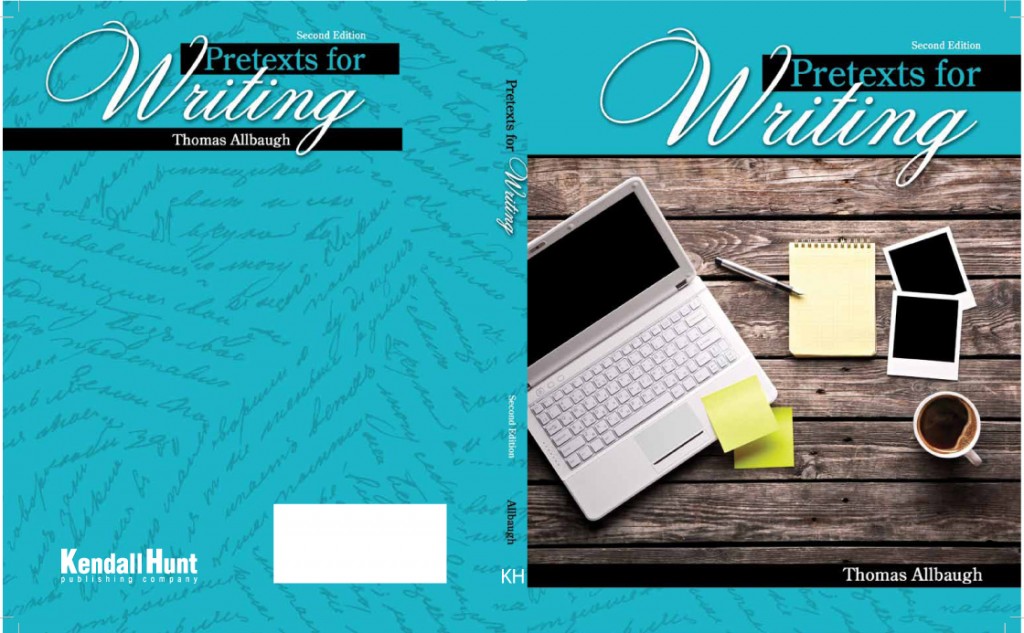What is the best way to approach a writing task, whether as a professional writer or a student? Do you procrastinate until the last minute and then start writing on page one and hope for the best? Or is there a better approach? My friend and APU colleague, Tom Allbaugh, confronts that problem in a very helpful guest post this week. Dr. Allbaugh is an accomplished writer who is celebrating the release of the second edition of his excellent writing textbook, Pretexts for Writing. I think you will enjoy what he has to say.
What I Wish Someone Had Taught Me About Writing
By Tom Allbaugh
In the first chapter of Pretexts for Writing, I tell a story about when I was a student in a freshman writing class. I tell of how I waited, like most students I see today, until one or two nights before the deadline to get started on my research paper. Even though this was 1974 and I had to write on an old typewriter, I pretty much started by sitting down to write what I hoped would be the final draft.
nights before the deadline to get started on my research paper. Even though this was 1974 and I had to write on an old typewriter, I pretty much started by sitting down to write what I hoped would be the final draft.
Teachers call this “top-down writing.” We see it all the time in the movies. The writer starts typing without planning, hoping that inspiration will show up. In the movies, of course, the writer becomes rich and famous. In real life—in my life, for that first college assignment—I struggled to complete six pages. I didn’t even think about my main point until well into that “final” draft.
Many of my students have told me that they like that I tell this story. They say that it helps them connect with my ideas. I’m glad that my plan to demonstrate an idea also serves the second function of connecting with my audience.
Why Didn’t Someone Tell Me?
Today, I do often wish that someone had taught me that writing needs to be planned. A plan can be simple and personal, but it will usually involve us in generating ideas, thinking about genre, and making audience considerations.
The writers I know or have read about in interviews sometimes discuss their composing process, and their approaches can be idiosyncratic. We know, for example, that C.S. Lewis took long walks. Beethoven did this also, planning his works as he went. Looking at his fragmented writing in his notebooks, with his scratched out notes and revised ideas, anyone can see the years of work it took him to sketch out his symphonies. Some have suggested that it took this composer a lot of digging to connect with his unconscious. Getting the unconscious into the writing act is perhaps what prompted Ernest Hemingway to stand at his typewriter at chest level and Mark Twain and Truman Capote to both write lying down.
Especially among creative thinkers, planning usually has this “mental” element to it, but it will also allow writers into the more conscious work of considering the kind of writing being attempted and who their audience is.
When I started out in college, I wouldn’t have thought like this. At eighteen, I worked from the belief that writing an argument or a research paper or a novel required only inspiration and self-expression. This is also probably why the research paper task always seemed so daunting to me. None of my teachers ever told me that I should probably plan what to write about. As early as the fifth grade, I was told about revision and that I should write an outline. But outlining is an organizing strategy and, suspiciously, does not always allow for other kinds of planning.
What I Know Now
Today, even in those rare instances when I get inspiration, I still know enough to allow myself time to generate more thoughts before I start. The planning can vary—brainstorming, free-writing, or conversation will work—depending on what I am writing. There’s much room for variation. Probably the only exception to this rule is when I write a journal entry.
But this is what I wish I’d been taught from the very start. So I have organized Pretexts for Writing to begin with planning, with what writing and speech teachers since Aristotle have called “invention.” This opening, I hope, will encourage thinking about different aspects of planning.
Thomas Edison is supposed to have said that his work involved about 5% inspiration and 95% perspiration. I may be off on his numbers just a little, but his point is clear. Inspiration is over-rated. But just getting to work and making some plans, I can usually encourage and generate some inspiration.

Comments 2
As a student of Dr. Allbaugh, I have heard some of these tips in class. His comment that “writing needs to be planned” is a helpful commandment that, while at first seems like extra work, actually eliminates a lot of strife later on in the organization process. I am a student in his Non-Fiction writing class. While Dr. Allbaugh encourages us to at first write freely and poetically from a prompt, I find that my writing is shallow and scattered immediately after. Good writing requires revision and organization. After some ideas get flowing, some sort of outline with a main idea must be the foundation for the final draft. Dr. Allbaugh is very good at encouraging students to begin writing, expand it to all its’ facets, and then contract it to be the final, organized, and clear essay. His advice is golden for a writer.
I’ve had Dr. Allbaugh for a creative fiction class and this guy has so much wisdom and insight. I learned so much from his class and thoroughly enjoyed his witty humor and humble talent. In regards to the question, what I wish someone had taught me about writing, I think there is a lot. There’s a lot because writing is different for everyone. Writing is such a broad thing that cannot be defined other than words on a page. However, I think that there is something I was taught, but never really took to heart, and that is what I would like to pose as my answer. I wish that people in the writing industry focused more on the consistency and the perseverance. One thing I’ve learned is to persevere and still to writing. So many times I have wanted to quit because I feel like I suck or that I’ve failed. However, the only way to get better at writing, aside from initially studying writing techniques, is to keep writing. Always put your pen on paper and write no matter what. A film professor, Jim Lincoln, has coined his term “Embrace the suck”. In other words, your first draft is going to suck and be filled with awfulness. The only way to get pat this is to continue to learn and let your writing mature as you do. William Goldman, screenwriter, once said that a writer should make a plan to write a specific amount of pages or minutes per night. Say you planned to write 2-3 pages a day. Always strive for the high mark, the 3 pages, because in that last stretch, the real magic lets itself unfold. This is one thing that I wished I had learned and taken more seriously. Perseverance and never giving up.